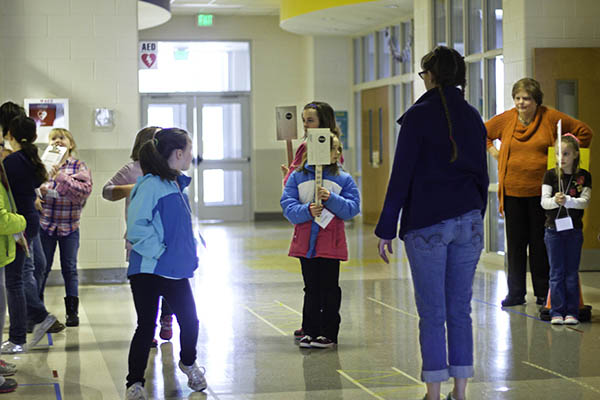Engineering the Future with girls EFG
Traffic this weekend caused a commotion at Mt. Horeb Elementary, as a group of fifty female students from the 3,4, & 5th grade, as imaginary cars, busses, pedestrians, and cyclists performed as rush hour traffic while newly appointed engineers control traffic. First-time voters instructed the highway department of residential and commercial needs to advance the flow of traffic through the intersections.
Engineering the Future with girls (EFG) is a two day event that celebrates Women in Engineering. This event, which is exclusively for girls in Jefferson County Schools, was held at Mount Horeb Elementary School on February 8th and 22nd. The two day event is from 9 a.m. To 12 p.m.
The materials for the event have been developed by Engineering is Elementary (EiE), Museum of Science – Boston. EiE is a curricular program that integrates science and Engineering Design Process. The two day event is filled with engaging engineering activities ranging from short video clips, games, speeches, slideshows, discussions, notes, and more.
EFG is hosted by JCS teachers and members of Phi Theta Kappa (International Honor Society) from Walters State Community College. EFG is funded by a grant from Girls Raised in Tennessee Science (GRITS) and a collaboration partnership between Jefferson County Schools and Phi Theta Kappa.
National Academy of Engineering (NAE) and National Research Council (NRC) find that exposure to engineering education at an early age has the potential to increase students’ awareness about what engineers do, their openness to engineering as a future career, and their technological and engineering literacy: all while improving student learning and achievement.
Engineering projects integrate other disciplines while engaging students with real-world, hands-on experiences. Engineering fosters problem-solving skills, learning, discussion, and dialogue about building and taking things apart to see how they work. Engineering and technological skills are necessary for the 21 century; the projects, lectures, and games will reflect this.
According to the Bureau of Labor Statistics, the nation will need 1.75 million engineers by 2018, an 11 percent increase, while some fields will see an increase by 30 to 70 percent growth. Women comprise more than half of the workforce in the United States, but they represent only 20% of the STEM workforce.










